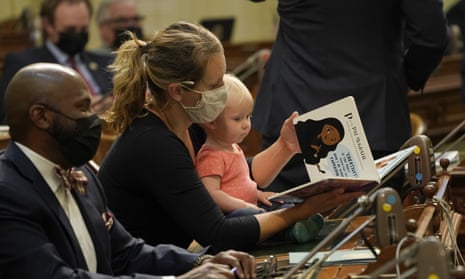Early one morning this fall, the California state assemblywoman Buffy Wicks felt a type of pain she had never experienced before.
Wicks, 44, found herself doubled over in pain, barely able to walk or get her daughter ready for school. At her doctor’s shortly after, she learned that she was pregnant and having a miscarriage and would need an emergency abortion. Twenty-four hours later she had the procedure.
Wicks shared the deeply personal account of what happened that September morning on Twitter on Thursday, following oral arguments in the most significant abortion rights case heard by the US supreme court since Roe v Wade.
Wicks decided to tell her story to illustrate the urgency of easily accessible reproductive care and warn of the risks this care faces if a Mississippi abortion law is upheld by the nation’s highest court, she told the Guardian.
How do I begin to unpack how deeply disturbed I was by yesterday’s Supreme Court arguments?
— Buffy Wicks (@BuffyWicks) December 3, 2021
Justice Sotomayor spoke for so many of us with this question. She spoke for me. ⁰⁰In September, I had a miscarriage requiring an emergency abortion procedure —
(tw // miscarriage) https://t.co/Bn1HozwZ3H
“We often debate these policy matters in theory, but in reality people like me experience the outcomes when lawmakers and policymakers make these decisions,” Wicks said.
“I think this is a story that is not uncommon,” she said. “I have a platform that I want to use to help further the cause and say: ‘This is my body and I can make my own decisions.’”
In her tweets, Wicks described how hard it had been to process what was going on – working through intense emotions while feeling intense pain. She described asking her doctor whether she would have had access to the procedure she was undergoing had she been in Texas, which this year banned abortions once cardiac activity is detected.
The doctor told her that even though the procedure would have been legal, given access issues, it could have been very difficult to obtain.
“Think about the cruelty involved in making it your aim to make life more difficult for someone in that situation: in great pain, bleeding profusely, barely able to walk, confused about what’s happening to them, unsure about where to go, and then forcing them to endure multi-state drives or frantic rushes to the airport for the next flight to a state where getting the medically necessary healthcare they need is still *legal* & *available*,” she wrote. “And that’s assuming they have the privilege & means to get those options.”
Similar issues are at stake with the abortion case in front of the supreme court, Wicks said. On Wednesday, the court heard oral arguments in Dobbs v Jackson Women’s Health Organization, which pits the leadership of the state of Mississippi against the state’s last abortion clinic. The state seeks to ban abortion after 15 weeks gestation and is asking the court to overturn Roe v Wade.
“When I was coming of age as a young adult, I thought Roe v Wade was the law of the land and that we had overcome oppressive draconian measures. But here we are again,” Wicks said.
In the hearings on Wednesday, the majority of the court appeared supportive of the Mississippi rules, with the newest supreme court justice, Amy Coney Barrett, asking whether women could simply “terminate their parental rights” at the end of pregnancy by giving a child up for adoption, instead of seeking an abortion.
Under the Mississippi law, Wicks would still have been able to get an abortion, but similar to the situation in Texas, the impact of closing clinics due to restrictions would make it hard for women to access care in their own communities, even in emergency situations like hers.
But if the Mississippi law is upheld, women across the nation may have to travel for hours to find a hospital or clinic, which can make abortions inaccessible for low-income women who are in need of care, she added.
“I was doubled over in pain at 4am. I had never experienced that, there’s no way I could have gotten on an airplane or driven miles to get care,” she said.
